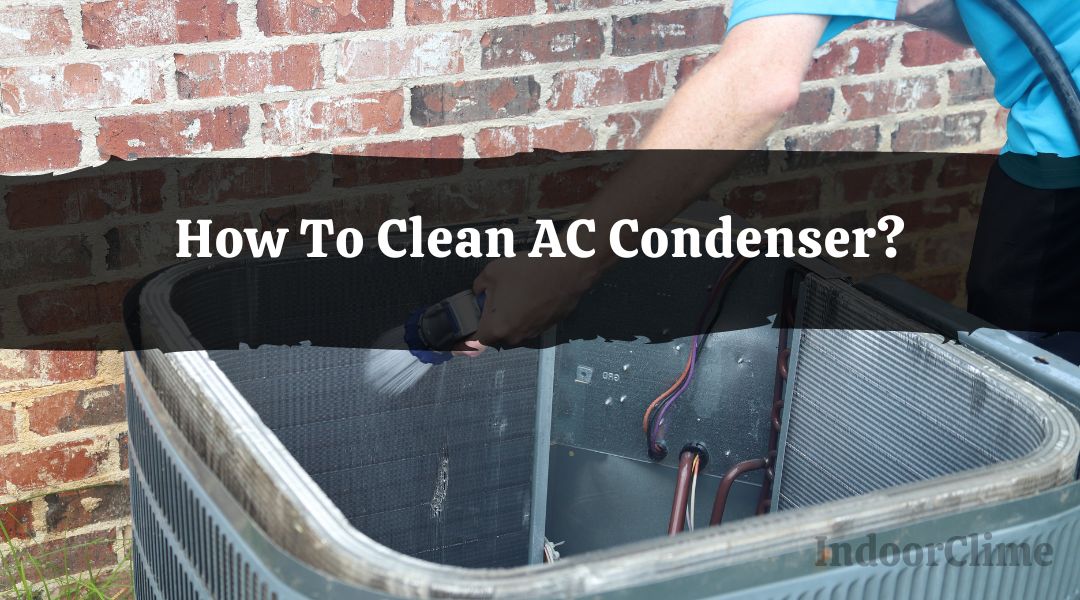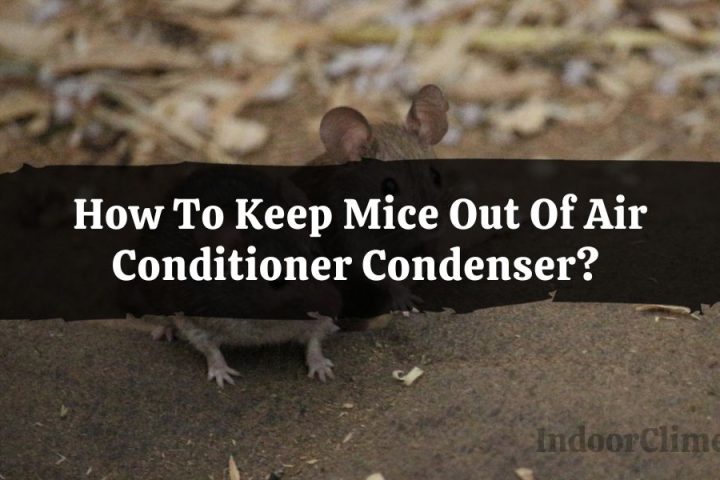A dirty AC condenser might be one of the causes of poor AC performance. Cleaning the air conditioner condenser in your house enhances peak performance and increases AC efficiency.
If you care for your AC condenser, you can enjoy an efficiently running AC.
To clean the AC condenser, you need to remove the cover, brush off the dirt, spray coil cleaner, then rinse and let the AC condenser dry. Clean space around the AC condenser and put a back cover.
Continue reading this article that will lead you through cleaning the AC condenser in your house. Cleaning is simple if the instructions below are followed.
What Are the Symptoms Of a Dirty Condenser?
When the condenser becomes too dusty, the AC’s performance suffers. But how do you determine when the condenser needs to be cleaned? A filthy condenser is apparent, according to most air conditioning service companies.
1. Lower cooling than usual
A filthy condenser could cause your air conditioner not to deliver as much cold air as it once did. A filthy condenser will lose its ability to reject heat.
As a result, the air conditioner is no longer as effective at cooling the space as it once was. Your condenser may be dirty if you notice a decrease in cooling power.
2. Loud and abnormal noises
If your air conditioner produces particularly loud noises, that’s another red indicator. Dirty condenser coils can produce a lot of noise.
Leaves, dirt, and other particles can sometimes get stuck in the condenser. Twigs or small leaves can get twisted up there.
These can generate loud noises, suggesting the need to clean the condenser. Look for AC maintenance services in your neighborhood if you don’t want to do it yourself.
3. Higher bills
If your power costs are significantly higher than usual, this might signify a filthy condenser. A filthy condenser reduces the energy efficiency of air conditioning systems.
Because the AC can’t deliver cooling in the same manner it used to, it needs to work significantly harder. This results in a significant rise in power costs.
If your utility expenses are greater than normal, it is time to inspect your condenser.
4. Buildup of fluid
A fluid buildup can occur when dirt or debris becomes caught in the condenser coils. The condenser’s function is to convert gas to fluid.
A clogged condenser can’t do its function effectively and may leak. You can observe liquid trickling from the air conditioner.
In this situation, contact an AC maintenance company to inspect your condenser coil.
You may be able to clean the condenser independently, but that is only half of the task. You must contact a service expert to clean the condenser coil properly and professionally.
Having a professional handle the job ensures that the above issues are addressed.
Can I Clean the AC Condenser Myself?

Yes, you can! AC condenser cleaning is a delicate operation that requires the proper supplies and instruments, particularly when safeguarding the engine, brushing, applying the solution, and washing.
As a result, make the following preparations for cleaning goods and tools:
1. Screwdriver
You’ll need a screwdriver to remove the front bumper to access the AC condenser. In addition, some screws from the front bumper must be removed.
2. Wrench
We’ll need a tool or wrench to remove bolts from the front bumper.
3. Garbage Bags
You’d need rubbish or garbage bags to safeguard the engine’s sensitive parts.
4. Shop-Vac With Soft-Bristled Brush Attachment
It is capable of removing junk from the AC condenser. If you don’t have one, a soft-bristled brush will suffice.
5. Coil Cleaner
A coil cleaning is required to remove the filth and grease from a car’s AC condenser. Make sure you use a cleaner made exclusively for cleaning an AC condenser.
Use caution while cleaning or degreasing since some products may react with the aluminum of the AC condenser and cause it to corrode.
Coil cleaners are available in concentrated solutions that must be diluted or in ready-to-use spray cans.
A ready-to-use spray makes cleaning easier and is the most acceptable approach to cleaning a condenser. You spray the cleaner on the AC condenser, which will froth up, then rinse it off.
6. Garden Hose
A garden hose will suffice when washing and cleaning off the AC condenser. It would help if you did not use a pressure washer on the AC condenser, mainly because the fins of the AC condenser are sensitive.
7. Air Compressor With a Blow Gun
Air Blow Gun with Brass Adjustable Air Flow Nozzle
After washing the AC condenser, an air compressor with a blowgun may readily remove any leftover water.
8. Protection Pieces
You can wear disposable gloves, safety glasses for eye protection, and a mask to avoid dust, filth, scent, or odor during the operation to avoid irritation.
How Do I Clean My AC Air Condenser?
AC condenser cleaning is effortless, especially with a decent foaming coil cleaner that removes dust and grease.
You’ll see how simple it is to follow the steps below. Make care you first put on the protective parts.
1. Remove the Cover
Every condenser is different, but the first step in cleaning an AC condenser is always to remove the cover. There will be some differences in the placement of the clips, screws, and bolts.
Then you’ll find all the clips, screws, and bolts that need removal. You can remove the front and show the AC condenser once you’ve removed them.
2. Take Necessary Precautions
Before cleaning, turn off your air conditioner and ensure the engine has cooled down. Take extra precautions to avoid damaging your air conditioner.
As a result, you’ll need to secure their delicate parts with garbage bags to avoid getting them wet and damaged.
3. Brush Off the Dirt and Debris
The dirt and debris accumulated in the AC condenser would be removed. To clean them, use a shop vac with a soft-bristled brush attachment or a soft-bristled brush.
Brush cautiously because the AC condenser’s fins are sensitive and should not be damaged.
4. Spray Coil Cleaner
After removing the dirt and debris, spray some coil cleaning on the AC condenser. If your AC condenser is split into two parts, clean each individually.
Shake the coil cleaning spray bottle before spraying the AC condenser cleaner over the surface of the AC condenser.
You will notice that the cleanser foams up as you apply it. Allow at least five minutes, but no more than 10 minutes, for the cleaner to work on the filth and grease.
5. Rinse
After the coil cleaner has cleaned the grime and grease from the AC condenser, rinse it well with a hose to remove all detergents.
If your AC condenser is two-part, start with the other side. Steps four and five can be repeated if required.
6. Let the AC Condenser Dry
After cleaning the AC condenser, you’ll need to drain the water. You can blow away the water if you have an air compressor and a blowgun.
7. Remove the Garbage Bags and Clean areas Around the AC Condenser
After the AC condenser has been cleaned and washed off dirt and grease, you may remove the garbage bags and clean the regions around the AC condenser.
8. Reinstall the Cover
When everything has been thoroughly cleaned, replace the cover. Secure it with all the clips, screws, and bolts you removed previously.
What Happens If Condenser Is Clogged?

A blocked condenser coil limits your air conditioner’s cooling ability. Because they operate as a barrier between the coils and the refrigerants, clogged condenser coils restrict airflow and make it more difficult for the air conditioner to extract heat.
A dirty condenser coil affects the efficiency of an air conditioner. To cool a space, the air conditioner must work harder than usual. Energy usage and expenditures grow as a result.
Dirty condenser coils can significantly reduce the longevity of an air conditioner. The longer your air conditioner operates, the less efficient it is.
Clogged condenser coils restrict airflow, causing the system to fail sooner than if it had been adequately maintained and cleaned.
People Also Ask
Can I use vinegar to clean AC coils?
Yes. Cleaning AC coils with vinegar and water is a common practice at home. However, vinegar is usually only helpful against minor dirt accumulations.
However, you may keep your coils in good shape by combining white vinegar and water in a spray bottle and spraying the solution onto the coils.
How do you make homemade coil cleaners?
You can use half a cup of vinegar, rubbing alcohol, and baking soda.
You can also have a mixture of soapy water and baking soda.
A three-to-one mixture of water and bleach (the smaller portion) in a spray bottle is an excellent natural treatment for cleaning the coils on your air conditioner.
Bleach will not only get rid of mold and mildew but also keep them from coming back.
Does cleaning AC condenser coils help?
Cleaning your air conditioner coils is essential for your central air conditioning system’s long-term health.
Cleaning the coils on your air conditioner is a vital part of AC maintenance that may help you save money, keep your system running efficiently, and extend its life.






